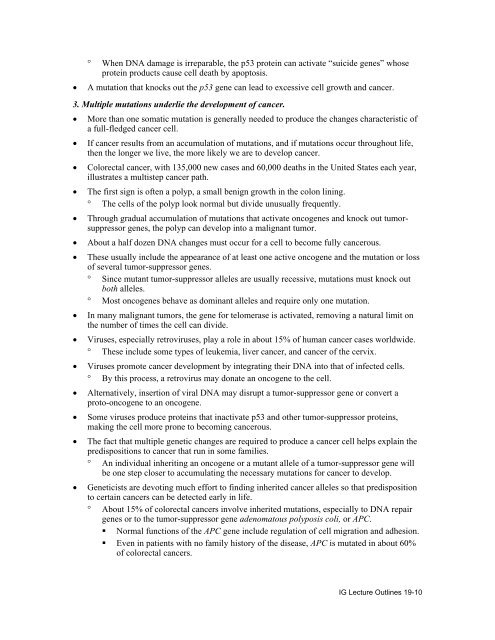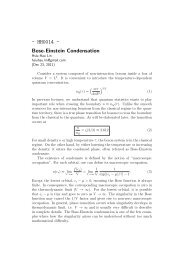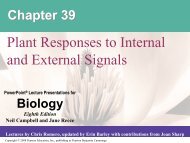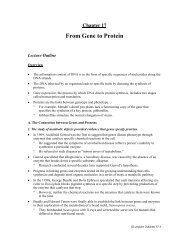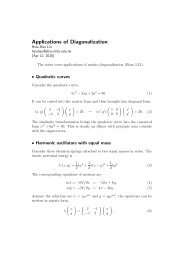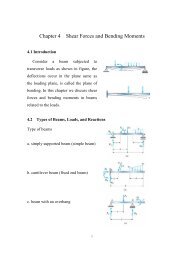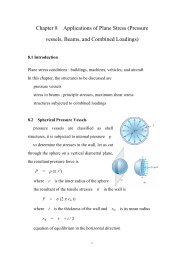chapter 19 the organization and control of eukaryotic genomes
chapter 19 the organization and control of eukaryotic genomes
chapter 19 the organization and control of eukaryotic genomes
Create successful ePaper yourself
Turn your PDF publications into a flip-book with our unique Google optimized e-Paper software.
° When DNA damage is irreparable, <strong>the</strong> p53 protein can activate “suicide genes” whoseprotein products cause cell death by apoptosis.• A mutation that knocks out <strong>the</strong> p53 gene can lead to excessive cell growth <strong>and</strong> cancer.3. Multiple mutations underlie <strong>the</strong> development <strong>of</strong> cancer.• More than one somatic mutation is generally needed to produce <strong>the</strong> changes characteristic <strong>of</strong>a full-fledged cancer cell.• If cancer results from an accumulation <strong>of</strong> mutations, <strong>and</strong> if mutations occur throughout life,<strong>the</strong>n <strong>the</strong> longer we live, <strong>the</strong> more likely we are to develop cancer.• Colorectal cancer, with 135,000 new cases <strong>and</strong> 60,000 deaths in <strong>the</strong> United States each year,illustrates a multistep cancer path.• The first sign is <strong>of</strong>ten a polyp, a small benign growth in <strong>the</strong> colon lining.° The cells <strong>of</strong> <strong>the</strong> polyp look normal but divide unusually frequently.• Through gradual accumulation <strong>of</strong> mutations that activate oncogenes <strong>and</strong> knock out tumorsuppressorgenes, <strong>the</strong> polyp can develop into a malignant tumor.• About a half dozen DNA changes must occur for a cell to become fully cancerous.• These usually include <strong>the</strong> appearance <strong>of</strong> at least one active oncogene <strong>and</strong> <strong>the</strong> mutation or loss<strong>of</strong> several tumor-suppressor genes.° Since mutant tumor-suppressor alleles are usually recessive, mutations must knock outboth alleles.° Most oncogenes behave as dominant alleles <strong>and</strong> require only one mutation.• In many malignant tumors, <strong>the</strong> gene for telomerase is activated, removing a natural limit on<strong>the</strong> number <strong>of</strong> times <strong>the</strong> cell can divide.• Viruses, especially retroviruses, play a role in about 15% <strong>of</strong> human cancer cases worldwide.° These include some types <strong>of</strong> leukemia, liver cancer, <strong>and</strong> cancer <strong>of</strong> <strong>the</strong> cervix.• Viruses promote cancer development by integrating <strong>the</strong>ir DNA into that <strong>of</strong> infected cells.° By this process, a retrovirus may donate an oncogene to <strong>the</strong> cell.• Alternatively, insertion <strong>of</strong> viral DNA may disrupt a tumor-suppressor gene or convert aproto-oncogene to an oncogene.• Some viruses produce proteins that inactivate p53 <strong>and</strong> o<strong>the</strong>r tumor-suppressor proteins,making <strong>the</strong> cell more prone to becoming cancerous.• The fact that multiple genetic changes are required to produce a cancer cell helps explain <strong>the</strong>predispositions to cancer that run in some families.° An individual inheriting an oncogene or a mutant allele <strong>of</strong> a tumor-suppressor gene willbe one step closer to accumulating <strong>the</strong> necessary mutations for cancer to develop.• Geneticists are devoting much effort to finding inherited cancer alleles so that predispositionto certain cancers can be detected early in life.° About 15% <strong>of</strong> colorectal cancers involve inherited mutations, especially to DNA repairgenes or to <strong>the</strong> tumor-suppressor gene adenomatous polyposis coli, or APC.• Normal functions <strong>of</strong> <strong>the</strong> APC gene include regulation <strong>of</strong> cell migration <strong>and</strong> adhesion.• Even in patients with no family history <strong>of</strong> <strong>the</strong> disease, APC is mutated in about 60%<strong>of</strong> colorectal cancers.IG Lecture Outlines <strong>19</strong>-10


